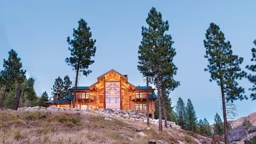Throughout their years of research and planning, Paul and Sandy Bortree had developed at least a partial vision of their future log home's location: They both dreamed of lakefront land. But when it came to the geographic region where this property would be, their mental picture grew a bit cloudy.
And so the couple's land quest involved not only the ideal building site but also a new hometown. The Bortrees' first move was to discuss exactly what they wanted in this new home base. "We developed a list of priorities that we referred to as our ABC list," Paul says.
Their top priority was to find a locale that wasn't too remote. Living in a Virginia suburb of Washington D.C., the Bortrees had grown accustomed to urban conveniences; plus, their careers brought certain needs. "We were looking for an area with a good transportation infrastructure, not too far from a major airport," Paul recalls.
After outlining their basic wants and needs, Paul and Sandy narrowed their choices to three metropolitan regions. "We called for the welcome packages from the three areas and then checked out the local web sites to get a feel for the places," Sandy says.
Charlotte, North Carolina, became the front-runner, for a variety of reasons. Aside from offering the benefits of a metropolis, complemented by rural surroundings, the area was within a reasonable drive of the Bortrees' present home. Also, although the region features relatively warm weather, residents still enjoy all four seasons; a definite plus to the Bortrees. Paul and Sandy's next step: subscribe to Charlotte's Sunday newspaper and look for suitable lots of land.
The Bortrees' serious search for the perfect property, however, could not begin without two key components: a Charlotte-area real estate agent and, at a minimum, a rough idea of the floorplan or house style. "You have to use a local Realtor so you're not unprotected with respect to the law," Sandy says.
The Bortrees' builder, Joe Weddington, a Katahdin Cedar Homes representative, reiterates the need for a knowledgeable agent. "If clients come to me without land, I always turn them over to a Realtor," says Joe, who operates Davidson, North Carolina-based Woodstream Natural Wood Homes. "If they have land in mind, I hook them up with a master surveyor before they buy it."
Not only can a real estate agent decipher local and state codes and regulations, he or she can also ensure that you consider all aspects of a site. "Clearly, the community or developer has to approve the type of structure you're building," Paul says. "But just because log homes may not specifically be excluded in a local covenant doesn't mean you have permission. If you don't know to ask the right questions, you may find out too late."
An experienced surveyor can safeguard your land investment by outlining the property boundaries. The combination of a surveyor and a Realtor provides added assurance that your dream home will fit the property you've selected. Some people own land for years before deciding what to build. But if, like the Bortrees, you're ready to build now, you may have a basic floorplan outlined prior to reviewing potential home sites. It's important to know exactly what views you can capitalize upon, as well as how much room will be needed to clear the foundation.
Because the couple had a solid concept of the floorplan, they could easily visualize where the house would sit. Of course, they had their own evaluation to test whether a given piece of land would suit their design. "Our primary focus was that the property would fit our house style," Paul says.
The style and layout of the couple's house serve as further testament to the Bortrees' resourcefulness and belief in ample research and preparation. Paul and Sandy found a conventional floorplan and, using a three-dimensional architectural program, modified the design slightly on their home computer. The changes produced a 2,100-square-foot-home with a three-car garage. "We needed a lot that was wide," Sandy says of the home's layout.
In considering potential sites, another crucial factor was developing a budget allowance for the property. That allowance can vary greatly from owner to owner, in large part according to the time frame for completing the home. "The amount you can spend on land depends on when in the home-building process that you buy the property," Paul says. "Is it five years before you're building?or six months?"
For the Bortrees, it was closer to the latter, meaning that their lending schedule would require several draws within a relatively short time frame. Having worked in a mortgage lender's office, Sandy knew the importance of pre-qualifying for all loans, as well as the need to outline a draw schedule clearly. Paul had done his part, preparing a computerized spreadsheet with room-by-room expense calculations. "So we had a cost-estimate for the entire house," Sandy says.
With the home's layout and cost-estimate in place, the Bortrees could look for a site?and make a realistic offer. The couple designated about 25 to 30 percent of the total cost of their project for land. That figure, the Bortrees and their builder stress, differs according to your situation. "Land is the biggest variable in the cost of home building," Joe says. "Everyone knows that the most important thing in a home is location, location, location. But it all depends on your budget."
Here again, Joe says, an experienced real estate agent saves you time and money. He or she can narrow your options down to those sites that fall within your budget and help you overcome various home-building obstacles. In somewhat rural areas, real estate agents can ensure that your land meets perk tests for septic systems. "As a term of the contract, we had the property re-perked," Paul says.
Fortunately for Paul and Sandy, they had developed enough contacts?both personal and professional?in the Charlotte area that it didn't take them long to locate their ideal site just outside the city. The somewhat brief land search was simply a result of the couple's patience and endless planning—as well as constantly sharing with each other their notions of the perfect home. "We had talked over the years about just what we wanted and envisioned," Sandy says. "And we got it."











